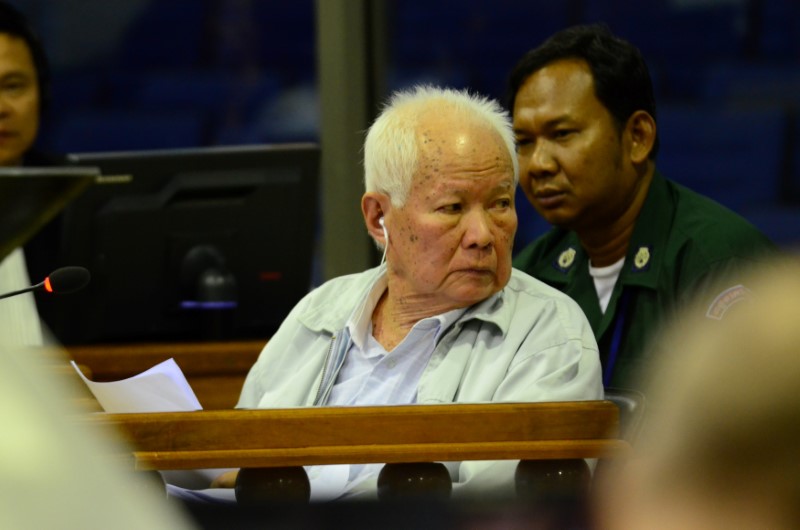By Prak Chan Thul
PHNOM PENH (Reuters) - A leader of Cambodia's Khmer Rouge denied on Friday that he and his colleagues were responsible for the death of an estimated 1.7 million people during their 1975-79 rule, saying their sworn enemy Vietnam invented the idea of genocide as propaganda.
Former president Khieu Samphan, 85, and Khmer Rouge "Brother Number Two" Nuon Chea, 90, face charges of crimes against humanity and genocide in the second case before a U.N.-backed tribunal known as the Extraordinary Chambers in the Courts of Cambodia.
The pair were among a small clique, led by Pol Pot, of mostly French-educated communists who rose to lead a bloody revolution against a U.S.-backed government after their country was engulfed by the Vietnam War.
Their regime sought to turn Cambodia back to "year zero" in its quest for a peasant utopia.
Most of the victims of the Khmer Rouge died of starvation, torture, exhaustion or disease in labour camps or were bludgeoned to death during mass executions in "killing fields".
Khieu Samphan and co-defendant Nuon Chea are the last two surviving members of the top leadership clique. Pol Pot, "Brother Number One", died in 1998.
"The term 'murder', I categorically reject it," Khieu Samphan told the court in the final stage of the trial.
"The Communist People of Kampuchea leaders did not exterminate our people. What was the interest in so doing?"
Khieu Samphan and Nuon Chea were found guilty of crimes against humanity in the fist phase of the complex trial and sentenced to life in prison in 2014.
The Khmer Rouge split amidst bloody purges of their ranks during their rule and many members from eastern zones fled to neighbouring Vietnam to return with a Vietnamese army in December 1978, which ousted the Khmer Rouge and sent them fleeing to the border with Thailand.
Ever since, the Khmer Rouge have blamed Vietnam for the disaster of their rule.
Khieu Samphan repeated that on Friday saying Vietnam had invented the notion of genocide as propaganda to justify their invasion with the "blessing of the current Cambodian leaders".
"Vietnam has never cooperated with this tribunal and finally it has invented the unacceptable idea of the Cambodian genocide," he said.
Many of Cambodia's current leaders, including veteran Prime Minister Hun Sen, were members of the Khmer Rouge who fled to Vietnam and were later installed in a Vietnamese-backed government in Phnom Penh.
Nuon Chea did not appear at the hearing on Friday due to "back pain", the court was told. He followed proceedings via a live video link to a holding cell.
Khieu Samphan said people were forced to work in labour camps because of "the immediate need to solve the problem of hunger", adding: "Is this something criminal? Of course not."
Nuon Chea's international defence lawyer, Victor Koppe, said the proceedings against his client were "a show trial ... to serve the interest of the American and Vietnamese aggressors".
After being forced from power, the Khmer Rouge became part of a U.N.-recognised and U.S.-backed government in exile that opposed the decade-long occupation of Cambodia by Soviet-backed Vietnam.

The tribunal has not set a date for a verdict.